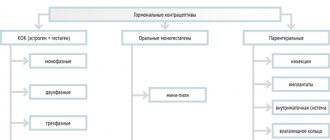message
Pregnancy pills after intercourse, so-called. Emergency or fire contraception can prevent pregnancy after unprotected sex or if the protection you are using has failed - for example, the condom has come off or broken, or you have missed a birth control pill. According to the latest WHO recommendations from 2021, indications for the use of “firefighting” agents will be:
- unprotected sexual intercourse,
- concerns about possible refusal of contraception,
- improper use of contraception and
- sexual violence if there was no contraception.
Mechanism of action - how does the tablet work 5 days later?
“The 5-day pill” is a pharmacological (hormonal) remedy indicated in case of unprotected sexual intercourse or refusal of a contraceptive method, to reduce the likelihood of unwanted pregnancy. In Europe, the medicine is sold under different names, for example, ellaOne. As of 2021, this option is included in the World Health Organization's list of essential medicines for this indication.
Pharmacological (hormonal) agent ellaOne®
“Pill after 5 days” is based on the active ingredient – ulipristal acetate. From a pharmacological point of view, this active ingredient belongs to the category of antiprogestins, that is, molecules that counteract the action of progesterone, a hormone fundamental to creating conditions suitable for fertilization and implantation.
Ulipristal acetate binds with high affinity to the progesterone receptor in an attempt to suppress or delay eventual ovulation by suppressing the rise in luteinizing hormone (LH) levels. Thus, the “after 5 day pill” prevents the fertilization of the egg released from the ovaries through the tubes and the sperm from reaching the uterus.
Effectiveness of the tablet 5 days later
Although the drug can be used within 120 hours. After unsafe contact, emergency contraception is more effective the earlier it is taken. The ideal option is 12-24 hours. after the act, when the success rate reaches 95-98% of cases.
Obviously, if ovulation has already occurred, the ability to avoid pregnancy is reduced, which makes this method not unsuccessful. If the sperm manage to meet the oocyte and fertilize it, then the medicine stops working - the drug does not work in the case of an already ongoing pregnancy.
This means that such a pill cannot cause an abortion. Medical abortion is performed with completely different drugs.
Emergency contraception and termination of pregnancy. What is the difference?
Emergency contraception is a way to avoid pregnancy during ovulation and fertilization. Thus, such drugs suppress ovulation and prevent the germ cells from uniting or prevent the fertilized egg from attaching to the uterus. It takes approximately 3 days for the egg to travel to the uterus. The same amount is needed to attach to its walls. This is why it is not advisable to use emergency measures after the 6-day period. In this case, termination of pregnancy will be required.
When and how to take emergency measures
The “5-day pill” can be taken up to 5 days (120 hours) after unprotected sex or if you suspect that the method of protection used during coitus did not work properly.
Ulipristal acetate can prevent unwanted pregnancy if:
- The condom was not put on before intimacy began or it broke or came off;
- The contraceptive ring fell out;
- The contraceptive patch fell off or was not reapplied after a 7-day break;
- A woman realizes that she forgot to take her daily birth control pill or had episodes of diarrhea or vomiting after taking it;
- A woman suffers from an unwanted and/or coercive relationship.
Diarrhea
It should be emphasized that the “5 day pill” is not a contraceptive method that should be used regularly, it should only be used in emergency cases.
The Five Day Pill can be taken at any time during the menstrual cycle. The course consists of one tablet, which must be swallowed with water. This should be done as soon as possible, but no later than 120 hours (5 days) after sexual intercourse. The drug can be taken at any time of the day, on an empty stomach or after meals.
Note: If you start vomiting within 3 hours of taking the tablet, it is important to take a second tablet as soon as possible.
Is it possible to get pregnant... and how to avoid it?
✅ Is it possible to get pregnant during your period?
According to surveys, about 40% of couples practice intimate relations (vaginal sex with ejaculation inside) more or less regularly on menstrual periods. Do you think you can’t get pregnant if you have sex during your period and “finish” the act in the vagina? This is a wrong opinion, and this misconception occurs not only among most men, but also among many women. To understand whether you can get pregnant on the last day of your period or the first time bleeding starts, you need to have an understanding of the menstrual cycle. It is divided into several phases, characterized by the production of certain hormones. Conception of a child occurs at the moment of ovulation or within a few days after it. If the egg is not fertilized in a given cycle, then the release of some hormones is replaced by others and another menstruation occurs. It would be logical to assume that it is impossible to get pregnant during menstruation, if not for one important nuance. Not every girl can know for sure when she will ovulate.
Most girls and women of middle reproductive age (18 - 40 years) have a relatively regular monthly cycle, but its duration may vary under the influence of internal and external factors. A standard cycle lasts an average of 28 days and ovulation (egg release) occurs on days 13-15. This is in theory. In practice, under the influence of stress, physical overload, climate change, illness, etc. ovulation may shift in time. And, as you know, male reproductive cells are able to survive in the female body for quite a long time. The favorable microflora of the vagina and the consistency of the discharge allow sperm to “stay alive” and wait in the wings for up to a week. Consequently, sexual intercourse occurred on the 5th day of menstruation and ovulation occurred in the girl on the 7th day, i.e. 48-72 hours after unprotected intercourse give a huge chance of unplanned conception.
Other partners prefer to change vaginal sex to anal or oral sex on THESE days, which also makes it impossible to get pregnant during menstruation and eliminates the need to take a birth control pill for emergency contraception.
✅ Is it possible to get pregnant from lubricant?
What is the likelihood and whether it is possible to get pregnant from male lubricant - these questions concern both couples who have stable sexual relationships with vaginal penetration, and girls who wish not to lose their virginity and allow imitation of sexual intercourse by movements of the partner’s penis in the area of the vaginal vestibule.
Theoretically, when released, male lubricant in its pure form does not contain sperm, since it is produced by a different gland. However, if sexual intercourse took place some time ago, and sperm can live in the urethra for up to 7 days and, therefore, it will be enough for them to mix with lubricant during any subsequent unprotected sexual intercourse for the woman to become pregnant. That is, if in this case the sperm meets an egg on its way, then the probability of getting pregnant from male lubricant is enormous.
What is the probability of getting pregnant from lubricant, depending on the phase of the menstrual cycle? The greatest chance of pregnancy from lubricant discharge occurs when a woman ovulates and in the coming days after it. You can avoid conception if you remember in the next 72 hours, or better yet 24 or 48, that emergency contraception is available. Modern gynecology offers several of the best contraceptives for “firefighting” purposes, which will be discussed below.
✅ Is it possible to get pregnant without protection?
Agree, this is a rather strange question. The likelihood of fertilization occurring at the end of sexual intercourse in the female vagina is maximum if neither partner uses contraception (condoms, hormonal contraceptives, IUDs, etc.). Of course, as elsewhere, in this case there are several conditions that significantly affect the possibility and success of pregnancy, such as:
- Suitable phase of the menstrual cycle;
- The condition of a woman's reproductive tract;
- No gynecological problems;
- Characteristics of male ejaculate, its usefulness;
- General health of M and F;
- The presence of bad habits and pathological addictions.
Thus, in some cases it is possible to become pregnant if you do not take protection, with a high degree of probability, but in others, even with the maximum possible combination of circumstances favorable to successful conception, it is not possible to have a child. The specialists of our clinic in Moscow will help you understand the reasons for the latter and provide effective treatment for infertility in women.
✅ Can a virgin get pregnant?
To find out whether it is possible to conceive a child and be pregnant while being a virgin, let’s make some clarifications. This may come as a surprise to some young people or girls, but a pregnant virgin is a reality, albeit not as common, but still. How do virgins get an appointment with gynecologists to register or have an abortion? Let's try to solve this equation with several unknowns...
✔ If the task has the following input data:
a) the girl has a intact, intact hymen; b) the girl is an actual virgin, i.e. does not have any intimate relationships (direct or indirect contact with the genitals of a representative of the opposite sex), then in this case we can say with confidence that such a virgin cannot be pregnant!
✔ If you make some changes to the original conditions of the problem and formulate them as follows:
a) the girl has a intact, intact hymen; b) the girl is a formal virgin, i.e. having a whole hymen, he practices various forms of sexual relations without penetration of the penis into the vagina (anal intercourse, surrogate imitation sex with ejaculation on the labia or in the vestibule of the vagina, various forms of mutual self-satisfaction, etc.). Such a virgin can become pregnant from both sperm and lubricant, even without a man’s penetration inside.
Now that we have learned about the main ways how you can get pregnant with a virgin, right away and the first time, we will behave more carefully, not rely on a lucky chance, and take care of choosing a method of contraception. Please consult our gynecologists. Competent and timely selection of a contraceptive will help you preserve your innocence and have the desired intimate relationship without the fear of ending up in an “interesting” position after it!
✅ Is it possible to get pregnant the first time?
How to avoid getting pregnant during sex for the first time, what can you do? Firstly, under no circumstances should you be fooled by the assurances of young people that a virgin does not become pregnant during her first sexual intercourse! Allegedly, the hymen prevents sperm from penetrating the uterus, so you can “tear” it without fear of undesirable consequences. A very popular scam among a certain category of guys. Usually these fables are told by people who want to persuade a partner to have sex without obligation, and they are to blame for many tragic situations among young girls.
The practical option that a gynecologist and common sense would recommend is using a condom. It almost completely eliminates the possibility of conception, and also protects the girl from unwanted diseases. Moreover, it will be very reasonable if they are in your purse directly, and not always with the guy. If there were no means of contraception, and the first sexual intercourse occurred, you can get pregnant very easily, especially on the days of ovulation.
Gynecologists are well aware that some virgins do not “get pregnant” due to “female” health problems, which are discovered only years later. There is also an element of “luck” and a psychological factor. All this led to the creation of a widespread myth that a virgin can have unprotected sex for the first time.
It is important to note that pregnancy does not only occur when the girl is already an adult. Even when you don't have your period, this can happen. In medical practice, it happens when 11-12 year old girls get pregnant.
How to avoid pregnancy for a girl who just lost her virginity? Do not panic, but make an appointment with a gynecologist for a consultation and discuss the need to take a contraceptive “pill after intercourse.” The main thing is to do it on time - emergency contraception is safe and effective no later than 48-72 hours after sex. It is a good idea to get tested for infections and carry out minimal prevention of inflammatory processes and STDs.
✅ Can masturbation get you pregnant?
It should be understood that for fertilization, the development of pregnancy and the birth of a child, certain requirements must be met. It is impossible without an egg and sperm, so getting pregnant during masturbation (on your own, without the participation of a man) will not work. If the process involves the participation of a man, then it is possible to become pregnant from masturbation with a finger if sperm gets on it. In the absence of even minimal contact of any kind with male semen, a girl will become pregnant, incl. virgins cannot.
5 Days Later Pill: What You Need to Know Before You Take
Before taking it, it is important to know that the “pill after 5 days”:
- Approved to prevent pregnancy for 120 hours (5 days) after unprotected intercourse and is not intended to terminate pregnancy in any way (does not have an abortifacient effect);
- The medicine cannot be used as a regular contraceptive, but only and exclusively in case of unexpected danger;
- Contraceptive action is limited to the only risky sexual intercourse that occurred before taking it. The drug is ineffective if another sexual intercourse occurs during the same cycle;
- Contraception does not guarantee protection against sexually transmitted diseases, such as, for example, HIV infection, chlamydia, genital herpes, genital warts, gonorrhea, hepatitis B and syphilis;
- Does not have a negative effect on subsequent fertility.
Although it is 97% effective, it does not prevent pregnancy in all circumstances. Therefore, if after taking it there is a delay of more than 5 days, it is necessary to exclude conception.
In what cases should you not use 72 hour tablets?
The main indication for using 72-hour birth control pills is to prevent pregnancy. They are not suitable for abortion; contraceptives cannot cause an abortion after implantation of the embryo. Contraceptives with levonorgestrel are contraindicated for:
- pregnancy;
- allergies to any component of the drug;
- severe liver failure;
- some hereditary diseases associated with lactase deficiency;
- malabsorption syndrome.
Mifepristone should not be used in the following conditions:
- early ectopic pregnancy;
- long-term treatment with corticosteroids;
- bleeding from the vagina;
- anemia and blood clotting pathology.
Can be used with caution for bronchial asthma, hypertension and heart failure.
What you need to buy in different countries
In most countries, birth control and abortion pills are sold strictly by prescription. Therefore, in such a situation you will have to come to the doctor for a prescription. For example, in Italy in October 2021, AIFA (Italian Medicines Agency) gave the green light to the sale of a 5-day tablet even to those under 18 years of age, eliminating the requirement to present a prescription.
In this country, the “five day pill” can be purchased directly from the pharmacy, since the drug ulipristal acetate is available without a prescription. But the purchase of the drug is accompanied by a booklet and instructions from the pharmacist in order to prevent the inappropriate use of emergency contraception. At the same time, a package of ellaOne® containing a 30 milligram tablet of ulipristal acetate is not cheap - approximately 26 - 30 euros.
But a drug based on levonorgestrel (the active ingredient of the morning-after pill), even in Italy, can only be purchased with a prescription from a gynecologist. It will not be sold without a doctor's prescription for any money.
Gynecologist's prescription for emergency contraception
Previously, it was possible to purchase such contraceptives only upon presentation of a valid document proving identity and age, and only after a mandatory pregnancy test with a negative result for beta-hCG.
If you have an emergency or difficulty purchasing an emergency contraceptive pill, in most countries you can also go to a public health centre, health service or emergency department.
Note. Emergency contraception offers women an additional choice. The pharmacist or health care worker is required to provide all the information so that the patient can receive the medicine and take it on time, but the entire responsibility for taking the pills lies with the patient herself.
What is the difference between the “morning-after pill” and the “5th day pill”
Levonorgestrel morning-after pills are an approved emergency contraceptive drug that are administered no later than 72 hours (i.e., 3 days) after sexual intercourse considered unsafe. This remedy can prevent the fertilization of an egg only if taken before the level of the LH hormone rises. Levonorgestrel cannot block ovulation once it has already begun. Consequently, confidence in the effectiveness of the drug is provided only by 48-52 hours before the start of the process that makes the egg available for conception. Therefore, the morning after pill should be taken sooner than the 5 day pill.
The 5 Day Pill, based on ulipristal acetate, may act by altering the activity of the hormone progesterone, delaying the process that leads to ovulation. The latter drug actually has a more targeted and powerful effect on the receptors of this hormone, and if taken just before the time when ovulation is expected (that is, when LH levels have already begun to rise), the drug can delay the rupture of the follicle by several days.
The 5-Day Pill is three times more effective than the levonorgestrel formulation when taken within the first 12 to 24 hours after unsafe sex, and lasts longer (up to 120 hours versus 72). However, neither of the two pills are suitable for abortion.
Completely different medications are prescribed for abortion. For example, the drug RU-486 is popular in Europe, used to terminate a pregnancy that has already begun. The drug actually causes abortion by causing the embryo to detach from the lining of the uterus. In most countries, RU-486 can be taken exclusively in hospital until the seventh to ninth week of pregnancy as an alternative to surgical abortion.
Important! Although the morning after pill and the 5-day pill can be taken up to 72 (3 days) or 120 hours (5 days) respectively after unsafe sex, they should be taken as soon as possible; the longer they take, the more their effectiveness decreases.
Types of postcoital contraceptives
Tablets that prevent unwanted pregnancy are produced based on two active ingredients:
- levonorgestrel is a hormonal substance from the group of gestagens, an analogue of progesterone;
- Mifepristone is a steroidal antiprogestogen substance.
These components differ in their mechanism of action. Levonorgestrel is a substance that acts similarly to endogenous progesterone, but has an anti-estrogenic effect. If taken before ovulation, it inhibits ovulation by suppressing the release of pituitary hormones LH and FSH. The egg does not mature, fertilization becomes impossible.
If you take birth control within 72 hours of ovulation, your risk of getting pregnant is higher. But levonorgestrel causes thickening of the cervical mucus, leading to changes in the endometrium that do not allow the embryo to implant.
The mechanism of action of mifepristone is different. It has an antiprogestagenic effect and blocks progesterone receptors in the endometrium. This increases the contractility of the myometrium. At the same time, there is an increase in the synthesis of prostaglandins, which increase the lumen of the cervical canal and also increase contractions of the muscle cells of the uterus. The fertilized egg cannot implant and leaves the organ cavity.
Contraindications and possible interactions - when NOT to use the tablet 5 days later
The “pill after 5 days” is contraindicated in confirmed pregnancy: in this case, it is actually ineffective.
In some cases, use of this medication may temporarily reduce the effectiveness of regular hormonal contraceptives such as pills and patches. For this reason, it is recommended to use a reliable barrier method of contraception, such as a condom, until your next menstrual cycle.
In addition, the 5-day pill should not be taken at the same time as a levonorgestrel-based contraceptive, as the mechanism of competition between the two drugs will reduce their effectiveness.
Other drugs that may interact with the 5-day pill include:
- medicines intended to treat epilepsy - phenobarbital, fosphenytoin, phenytoin, oxcarbazepine, primidone and carbamazepine;
- HIV infections - ritonavir, efavirenz and nevirapine;
- some bacterial infections - rifabutin, rifampicin and griseofulvin.
You should also pay attention to herbal products containing St. John's wort.
The "tablet after 5 days" is not recommended for severe asthma, lactose intolerance and hypersensitivity to the active substance or any of the excipients.
The drug should not be taken by women with severe liver dysfunction or malabsorption syndromes (such as Crohn's disease), which may reduce its effectiveness. Therefore, in all these cases, it is recommended to consult a doctor to decide which drug to take if emergency contraception is needed.
In addition, it is important to understand that after taking the drug you will have to postpone breastfeeding for about a week.
Review of emergency contraceptives 72 hours
The pills, which are used to prevent conception after sexual intercourse, can be purchased without a doctor's prescription. They can be used by women of fertile age over 18 years of age. Such hormonal drugs are not recommended for adolescents.
№1 Postinor
A progestogen drug for immediate protection, which includes a single dose of 0.75 mg levonorgestrel. The Postinor blister contains 2 tablets, which are divided into 2 doses . You can take the entire dose at one time if the woman is in the middle of her menstrual cycle and there is no high probability of ovulation within a few hours after sex. The cost of a pack is 310-342 rubles.
No. 2 Escapelle
The drug Escapel contains the active ingredient levonogrestrel, but in an increased dose of 1.5 mg. For contraception, one tablet is taken, which cannot be divided or crushed. Repeated administration of the medicine is required only in case of vomiting in the next 2-3 hours. Price 382-406 rub.
Attention! A large dosage of the hormone increases the likelihood of adverse reactions. Levonorgestrel in such quantities may exhibit weak androgenic properties.
No. 3 Genale
Zhenale birth control pills are based on mifepristone. A single dose is 10 mg. It is enough to increase myometrial contractility and prevent implantation of the fertilized egg. But as the dose increases, the risk of adverse reactions increases. To terminate pregnancy, analogues of Zhenale are used, but with a concentration of the active substance 60 times higher. The average price of emergency contraception is 450 rubles.
No. 4 Eskinor-F
The package contains 2 tablets based on levonogrestrel. It is recommended to use them no more than once during the cycle. But emergency contraception does not replace the subsequent use of condoms.
Eskinor-F, like other drugs in its group, can cause intermenstrual bleeding and cycle disruption. Therefore, it is better to resort to this method of protection against pregnancy as a last resort. The cost of tablets is on average 350 rubles.
No. 5 Gynepriston
Tablets with mifepristone in a dosage of 0.01 g. Prevent implantation of the embryo into the uterine wall.
It is recommended to take them 2 hours before meals or 2 hours before meals to increase the contraceptive effect. The package can contain 1 or 2 tablets. Women who have had more than 24 hours after unprotected sex, or who are in the middle of their menstrual cycle, should take a double dose.
No. 6 Modell 911
Levonorgestrel tablet at a dose of 1.5 mg, the package contains 1 piece. Research shows that this drug is highly effective and helps prevent pregnancy in 84% of cases. If you use 2 tablets of 0.75 mg with an interval of 12 hours, the chances of not getting pregnant are reduced to 79%. The cost of packaging is about 400 rubles.
Side effects and risks after taking the “5 days later pill”?
As with all hormonal medications, after taking the “after 5 day pill” there is a possibility that side effects such as spotting, headache, nausea may occur relatively frequently. Patients experience vomiting, mood swings, lower abdominal pain and a feeling of exhaustion. These effects usually subside within 48 hours of taking the tablet and are almost always minor.
Headache
In addition, during the month of use, disturbances in the next menstrual cycle may occur - delays or delays, painful or prolonged periods, irritation or discharge from the vagina, decreased or increased libido, heavier discharge, etc.
Other side effects for this type of medication are less common (1/100) and include chest tenderness, muscle pain, dizziness, diarrhea, and hot flashes.
During clinical trials conducted before marketing the drug, no side effects were found that could stop the trial. Thus, overall, the 5-day pill is well tolerated and effective, but remains an emergency intervention that cannot be used routinely.
Important!
The “pill after 5 days” should be used exclusively as a method of emergency contraception and only in emergency cases. This drug should not be an alternative to classical contraceptives, especially since there are cheap and safe ways to prevent unwanted pregnancy.
MAKE AN APPOINTMENT
[contact-form-7 id=”296" title=”Untitled”]
Abortion and contraception clinic in St. Petersburg - department of the medical gynecological association "Diana"
Make an appointment, tests or ultrasound via the contact form or by calling +8 (812) 62-962-77. We work seven days a week from 09:00 to 21:00.
We are located in the Krasnogvardeisky district, next to the Novocherkasskaya, Ploshchad Alexander Nevsky and Ladozhskaya metro stations.
The cost of a medical abortion in our clinic is 3,300 rubles. The price includes all pills, an examination by a gynecologist and an ultrasound to determine the timing of pregnancy.
Emergency contraception procedure at Diamed clinics
Our clinic specialists will help you avoid the dangerous consequences of emergency contraception. Here you can take all the necessary tests, including a blood test for hCG. An experienced doctor will examine you, prescribe the drug and explain how to take it correctly.
In addition, experienced doctors will monitor after treatment and help you choose the optimal method of planned contraception. The guarantee of contraception in Diamed clinics is truly one hundred percent, because the prescription of drugs here is carried out by professionals who have extensive experience in the field of gynecology.






